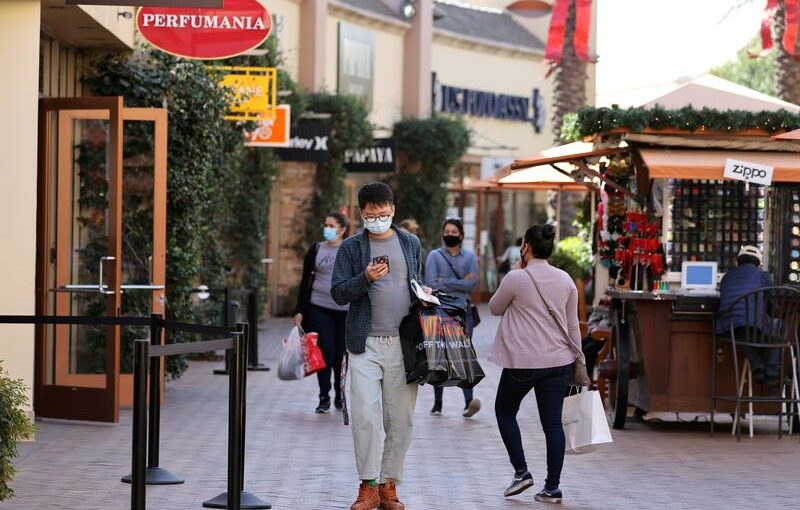WASHINGTON (Reuters) – U.S. consumer confidence rose moderately in January while lingering concerns about the COVID-19 pandemic led to a further deterioration in households’ perceptions of the labor market, raising the risk of a second straight month of job losses.
The Conference Board said on Tuesday its consumer confidence index increased to a reading of 89.3 this month from 87.1 in December. Economists polled by Reuters had forecast the index little changed at 89 in January. The slight increase likely reflected the rolling out of vaccines for the coronavirus, which lifted consumers’ near-term expectations.
The index was at 132.6 last February. The cut-off date for the survey was Jan. 14. The survey’s present situation measure, based on consumers’ assessment of current business and labor market conditions, fell to a reading of 84.4 from 87.2 in December. The expectations index based on consumers’ short-term outlook for income, business and labor market conditions increased to 92.5 from a reading of 87.0 in December.
“Consumers’ appraisal of present-day conditions weakened further in January, with COVID-19 still the major suppressor,” said Lynn Franco, senior director of economic indicators at The Conference Board. “Consumers’ expectations for the economy and jobs, however, advanced further, suggesting that consumers foresee conditions improving in the not-too-distant future.”
More than 25 million people have been infected by the virus, with the death toll over 420,000 since the pandemic started in the United States in early 2020. About 6% of the U.S. population has so far been vaccinated. President Joe Biden’s new administration has pledged to speed up and simplify the distribution of vaccines.
U.S. financial markets were little moved by the data.
Graphic: Consumer confidence –
NEAR-TERM LABOR MARKET OUTLOOK DIMS
The survey’s so-called labor market differential, derived from data on respondents’ views on whether jobs are plentiful or hard to get, deteriorated to a reading of -3.2 this month from -1.9 in December. That measure closely correlates to the unemployment rate in the Labor Department’s employment report.
The economy shed jobs in December for the first time in eight months.
The share of consumers expecting an increase in income decreased to 14.4% from 15.7% last month. The proportion anticipating a drop declined to 14.2% from 14.6% in December.
Despite uncertainty about the future, the housing market continues to boom. The pandemic has fueled a migration from city centers to suburbs and other lower-density areas as Americans seek more space for home offices and schooling. Demand has also been fueled by record-low mortgage rates.
But supply has failed to keep up with buoyant demand, leading to a surge in house prices, which economists and realtors warn could put homeownership out of the reach of many first-time buyers. A separate report on Tuesday showed the S&P CoreLogic Case-Shiller 20-metro-area house price index jumped 9.1% from a year ago in November after rising 8.0% in October.
Graphic: U.S. home prices and home ownership –
Robust house price inflation was corroborated by a third report showing the Federal Housing Finance Agency (FHFA) house price index surged a seasonally adjusted 11.0% year-on-year in November after increasing 10.3% in October.
The FHFA’s index is calculated by using purchase prices of houses financed with mortgages sold to or guaranteed by mortgage finance companies Fannie Mae and Freddie Mac.
Source: Read Full Article
